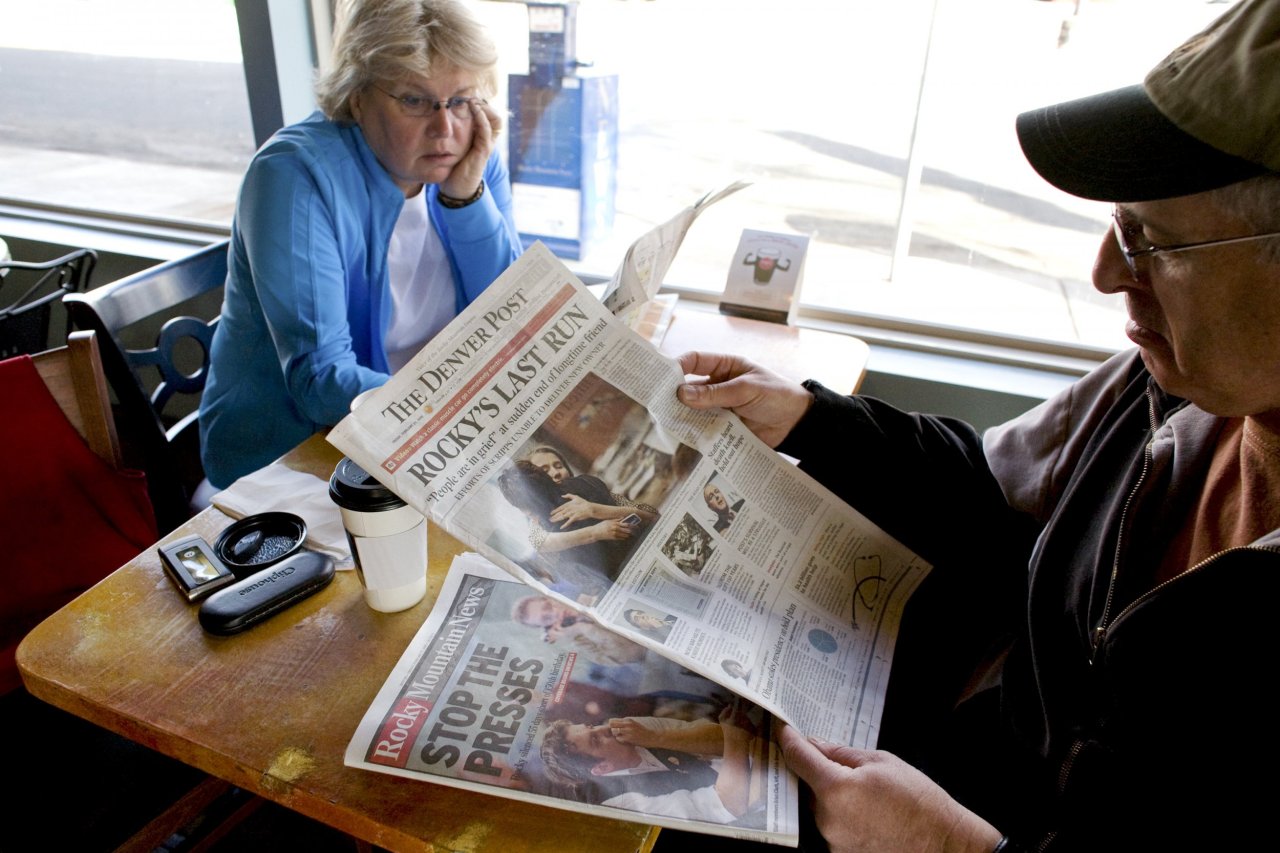Tech entrepreneurs are always chattering that they don't care about money—they just want to make a better world.
Well, if that's true, here's a challenge that would do more to make a better world than yet another app like Places I've Pooped. (Oh yes, it exists.) How about coming up with a great business model for solid, objective journalism that appeals to a broad market across the political spectrum? It might be the most profound way to help close America's deep divide—and save us from something like that Russian Revolution scene in Dr. Zhivago.
The absence of a common, cross-cultural base of facts and understanding is, as they say in the White House, a bigly problem. This nation, more than perhaps any, cannot function without a widely respected press. It's why we've wound up with alternative facts and two political bubbles that are more polarized than dogs and cats.
Solid, objective, high-integrity journalism has had a disastrous 21st century. It used to be a good business. For about 100 years before the pre-internet era, creating a news outlet was expensive. You had to own a printing press or radio or TV station. That meant fewer sources of news—three TV networks, a newspaper or two in most cities—served much broader audiences. So the smart business decision for a journalistic enterprise was to be apolitical; otherwise, it would alienate half its audience. By playing to a mass market, news made huge profits.
Related: Newspapers no longer own the news
Cable TV and, later, the internet drastically changed that equation. They made creating a news outlet cheaper, and the number of such outlets exploded, shattering the audience into small bits. To compete, the smart business decision became one of playing to the biases of a passionate, narrow market. It's how we got Fox News and Breitbart. In just the past year, social media has added a rocket boost to that strategy. The way to break through the noise on Facebook or Twitter is to be as inflammatory and biased as possible.
The business model for broad-based, unbiased journalism got kicked in the gonads. At newspapers and magazine companies, advertising drained out and stock prices plummeted. New York Times Co. stock is one-fourth its 2002 peak. In 2014, print- and online-media companies employed 20,000 fewer journalists than 20 years before, according to the Pew Research Center. The situation is only getting harsher. In 2016, Pew counted 400 buyouts or layoffs at newspapers. (And, by the way, how ironic that journalists get accused of not knowing how it feels to be an economic victim. When will Donald Trump demand that a newspaper not be closed to save jobs?)
In television, CNN, Fox and other news networks are doing well, thanks to all the viewers watching—either in joy or horror—to see what Trump does next. Yet CNN, for instance, is no longer Ted Turner's swashbuckling independent company; it has to worry about profit margins as part of Time Warner. So we end up with cheap-to-produce panels of arguing partisans instead of thoughtful reporting and analysis. Almost all TV news operations face similar pressures from their corporate conglomerates. Plus, TV is about to suffer print media's trauma as growing numbers of consumers pull the plug on cable TV and get their news from Facebook and Snapchat feeds.

Such economics have hurt mainstream journalism. How could they not? Fewer people have had to do more work, often contributing to print, video and online outlets at a frenzied pace. Last fall, a Gallup poll showed that 32 percent of the public and only 14 percent of Republicans trust the mainstream media. The devastating dynamics of economics and polarization have left centrist journalism with a dwindling fan base while more people embrace the bias-stoking wings. No wonder we can't talk to one another.
The job of the press is to be the public's advocate, to ask questions other people can't, to work to find out what's really happening and to clearly, unemotionally tell people the facts. At its core, good journalism is really about giving us a way to talk to one another about things that matter.
But to get there again will require a better business footing, and a new way of thinking. This is where the techies come in.
After Trump caused havoc with his first blitz of executive orders, tech founders and CEOs—many of them first- or second-generation immigrants—spoke up in ways business leaders rarely do. Google co-founder Sergey Brin joined a protest at San Francisco's airport. Apple CEO Tim Cook said, "It's not a policy we support." Netflix CEO Reed Hastings called the ban on immigrants "so un-American it pains us all."
These are the people who know how to reinvent entire sectors. We need them to step up and get into the mainstream media business and do to it what tech entrepreneurs have done to movies, maps, taxis and countless other businesses: invest money, talent and 21st-century thinking into a vital institution. Cook's Apple has $237 billion in cash on hand, and he could single-handedly fund some new way to produce and market great journalism from now until the first news bureau opens on Mars. Facebook's Mark Zuckerberg may have his hands on the most powerful levers for journalism in history. Same for Brin and Larry Page at Google.
And profitable journalism is no fairy tale. Amazon CEO Jeff Bezos bought The Washington Post for $250 million in 2013 and invested $50 million into operations last year alone. While in the journalism world that's like a homeless guy winning the Powerball jackpot, to Bezos, who's worth $70 billion, it's a week's worth of interest in his passbook savings account. But money is only part of it. Bezos brought in a crack team of engineers, revamped the Post's app and website and recast the company culture as a "media and technology company." The Post is setting records for subscriptions and is hiring 60 reporters. It is profitable. Advertisers seem to like being associated with integrity. Mass marketers want to reach the broad middle. It can get dicey for them to wind up next to an Alex Jones rant about the Obama administration faking the killing of Osama bin Laden.
As we've learned in the first 22 years of the internet era, a free press gets you nothing by itself. Without credibility, it's noise—or, worse, propaganda. A new business model that restores the press's credibility can work in this tech age, and it has to work.
The smartest, most powerful people in technology owe their enormous success to a stable, thriving America. Reinventing journalism is an urgently needed way they can pay back that debt.






















